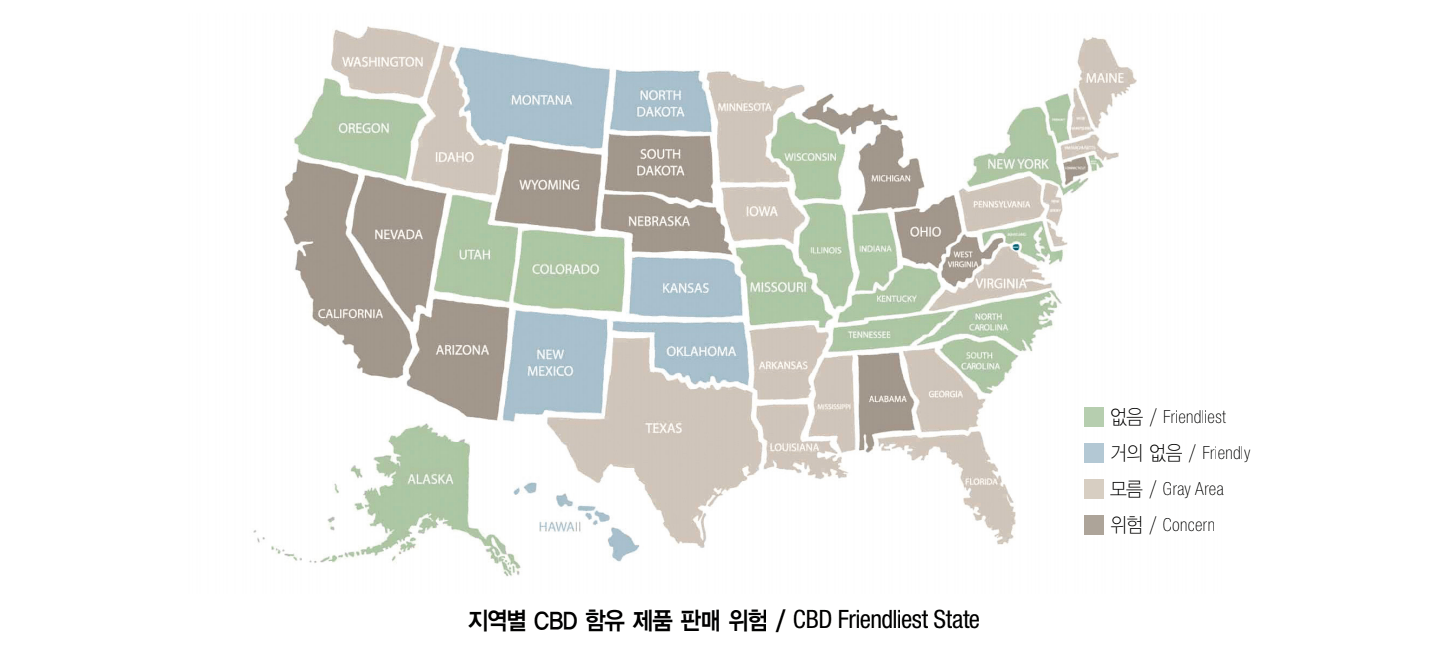Safe States Selling CBD Oil
The CBD, which has recently been legalized, is very popular, so you might want to consider selling it on a beauty supply store. By the way, there might be cause any problem. Let’s see what it is. President Trump signed the Agriculture improvement Act on December 20, 2018. For the American, this law is called FIRM LAW 2018. The reason because this law got so much attention is that CBD extracted from marijuana have legalized. CBD is known to be effective for the treatment of pain elimi-nating, relieving childhood epilepsy and some skin care effect. Smoking marijuana is still illegal under federal law, but more than 10 states, including Colorado and California, are legal by state law. However, CBD, a hemp extract, is legal by federal law. This legal environment may cause confusing due to conflict between federal law and state law. CBD legitimized in federal law is limited to those extracted from hemp only, less than 0.3% THC, the hallucinogenic component of marijuana. Since CBD is legalized under federal law, it is easy to think that there might not be a problem for the entire United States to sell products containing industrially produced CBD, but it is not. Because it takes time to revise the state law, there is a conflict between the state law and the federal law. One of this type of case is that CBD-ontaining products that are produced industri-ally are sold in retail stores. There are four types of categorizing for potential problem in selling CBD-containing products in retail store such as Friendliest, Friendly, Gray Area
and Concern.
Friendliest States: These jurisdictions have explicit laws allowing retail-ers to sell industrial hemp-derived products. These states include Alaska,Colorado, Illinois, Indiana, Kentucky, Maryland, Missouri, New York, North Carolina, Oregon, Rhode Island, South Carolina, Tennessee, Utah, Vermont,and Wisconsin.
Friendly States: In these jurisdictions industrial hemp grown in a Farm Bill-compliant agricultural pilot program is explicitly exempted from the defi-nition of marijuana. These jurisdictions include the District of Columbia, Ha-waii, Kansas, Montana, New Mexico, North Dakota, and Oklahoma.
Gray Area: These jurisdictions are without explicit prohibitions against the retail sale of industrial hemp-derived CBD products but that have ex-emptions in the law for the argument that hemp-derived CBD products are legal. These jurisdictions include Arkansas, Delaware, Florida, Georgia, Idaho, Iowa, Louisiana, Maine, Massachusetts, Minnesota, Mississippi, New Hampshire, New Jersey, Pennsylvania, Texas, Virginia, and Washington.
States with Concern: These jurisdictions have no explicit prohibitions against the sale of industrial hemp-derived CBD products. However, recent law enforcement actions or pronouncements raise the risk of the retail sale of
industrial hemp-derived CBD products. These jurisdictions include Alabama, Arizona, California, Connecticut, Michigan, Nebraska, Nevada, Ohio, South Dakota, West Virginia, and Wyoming.

The following is a simple map with the above explanations. A online store that sells CBD-containing products tells people who buy prod-ucts for resale purposes that it may be a problem, saying “Selling on your own risk.”
Another noteworthy concern about CBD sales is that the US FDA is pushing CBD to make it a drug, as reported by POLITICO, a recent US online maga-zine. An FDA official said, “The CBD has been known to be an all cure, but it has not been known exactly how much it can be used for, and the FDA is clearly defining consumer goods that can derive CBD.” Foods are the first to be reviewed. If FDA establishes rules for use categories, it means that the scope of CBD-containing products may be limited. This is why you should look carefully at the FDA’s activities.
Industry News
BNB Magazine 2019, July ©bnbmag.com
ABOUT US / SUBSCRIBE / ADVERTISE WITH US / PARTICIPATION / CONTACT /